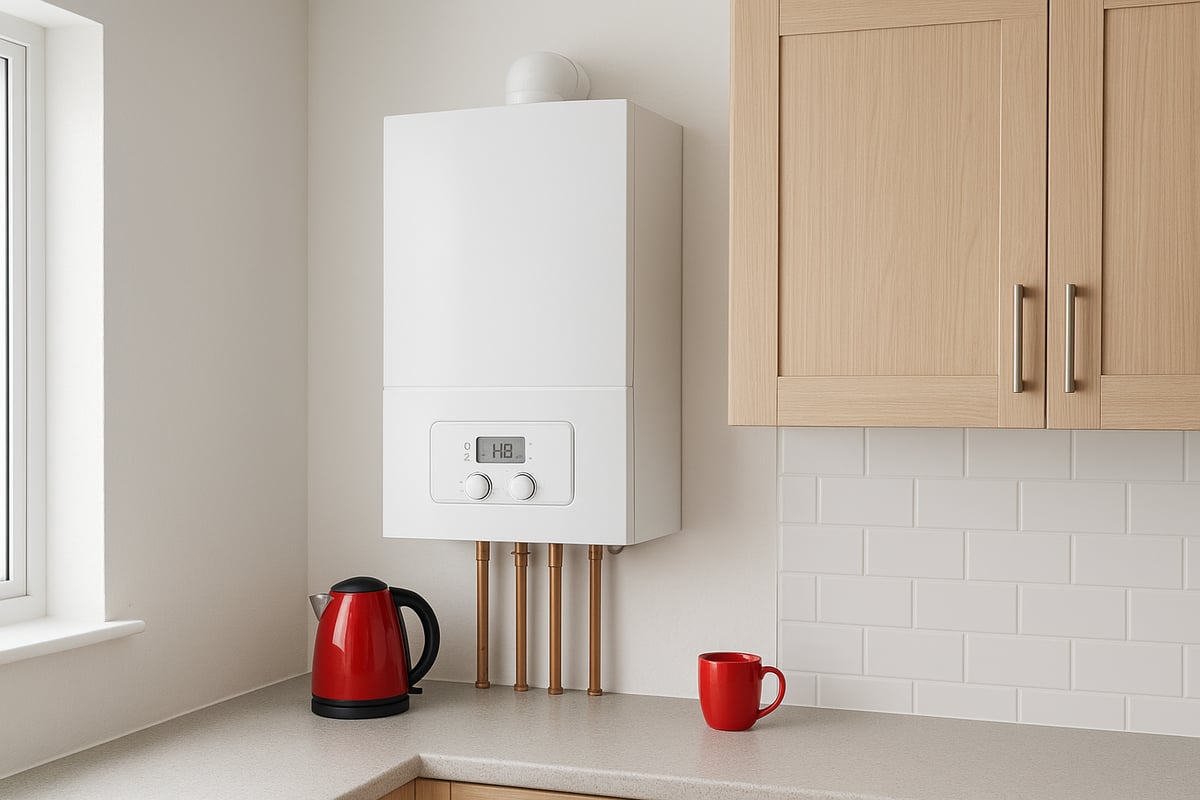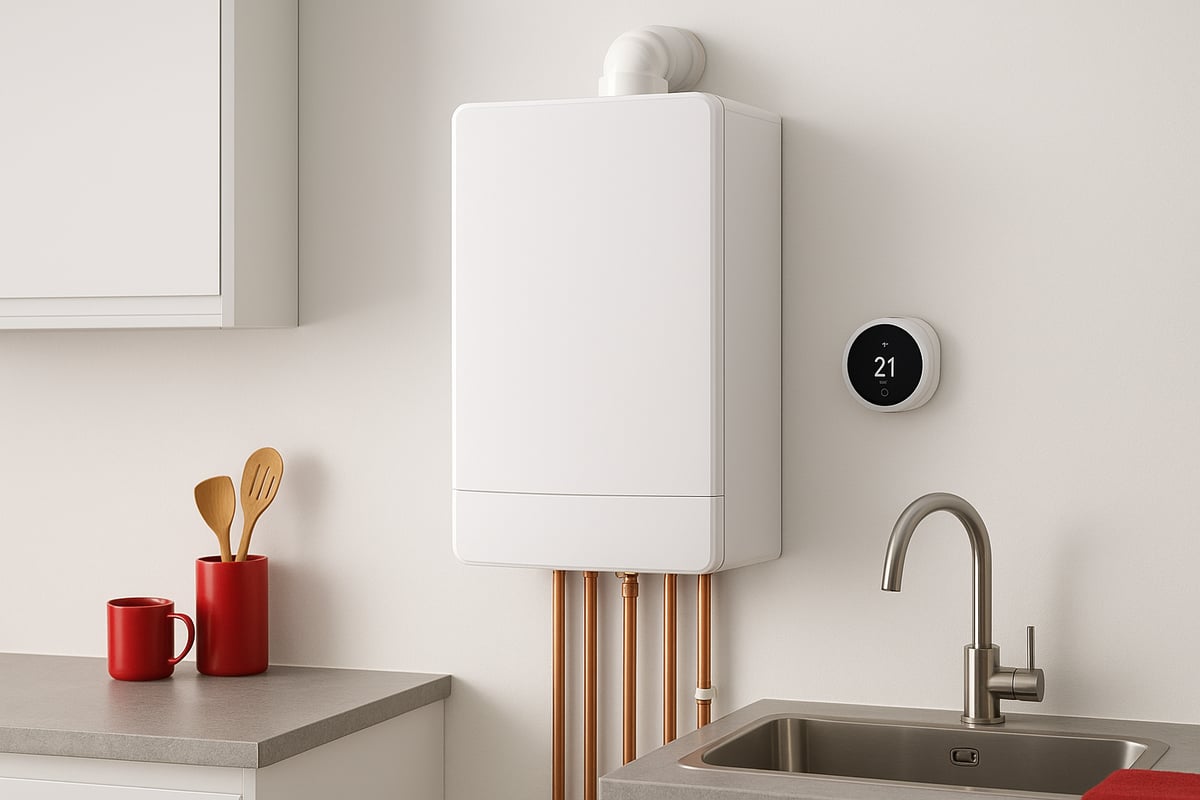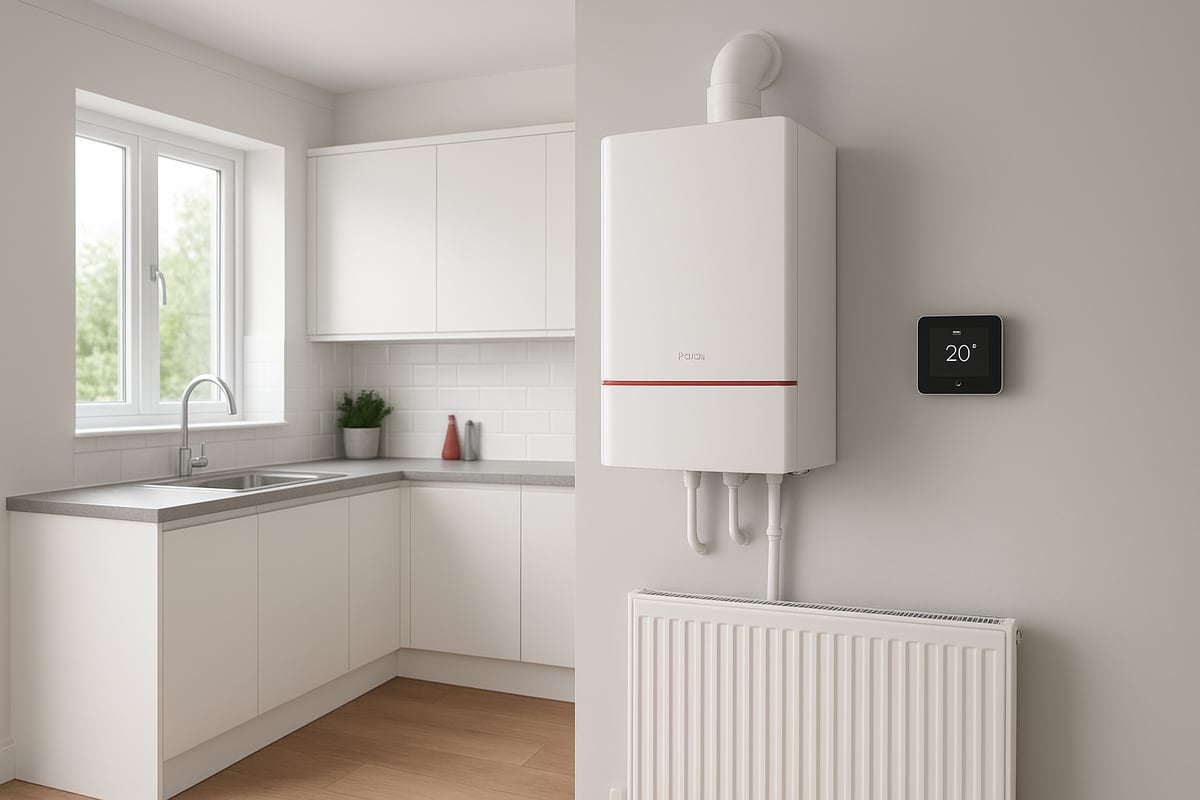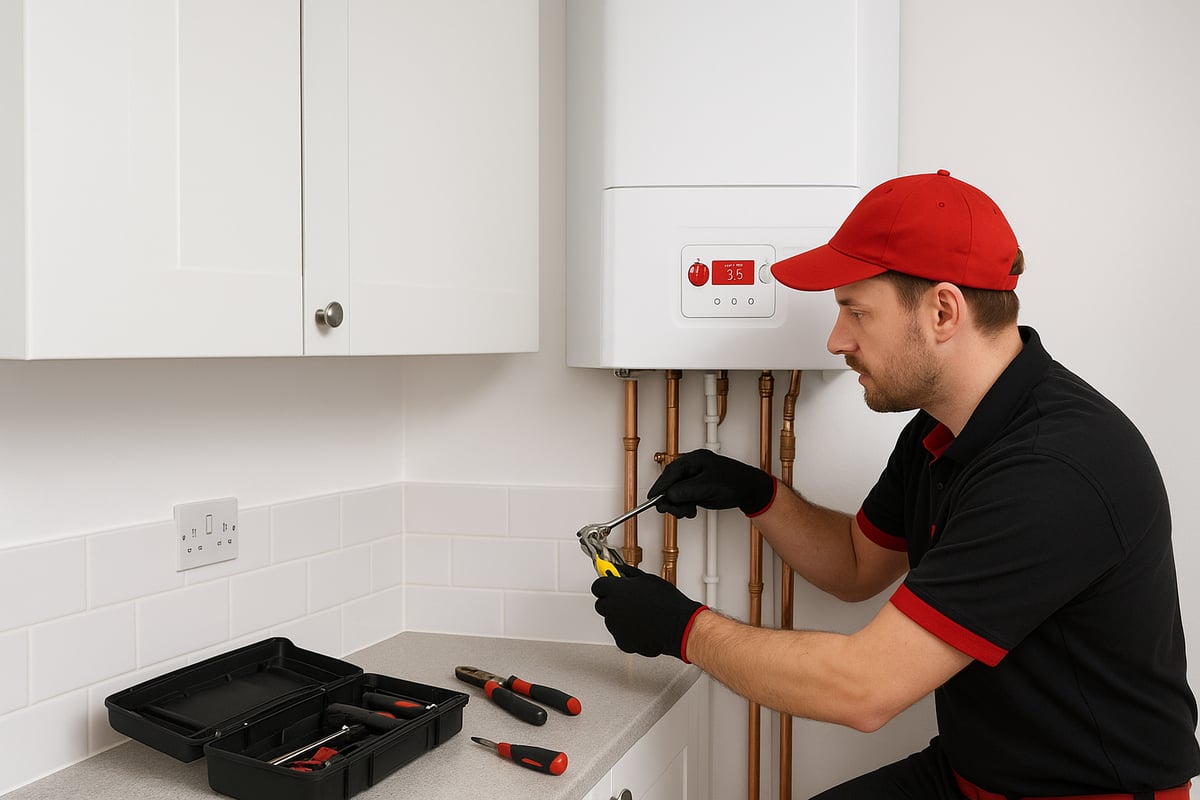The Essential Guide to Combi Boilers for 2025
As we move into 2025, energy-efficient home heating is becoming more important than ever for UK households. Many homeowners are turning to combi boilers for their ability to save space and reduce costs.
Choosing the right combi boilers can transform your comfort at home, lower your energy bills, and help shrink your carbon footprint. With new regulations and evolving technology, making an informed choice is essential.
This article serves as your comprehensive, up-to-date guide to combi boilers for 2025. We will cover what combi boilers are, how they work, their key benefits, what to consider in 2025, installation and maintenance steps, costs, and the latest future trends.
What is a Combi Boiler?
Choosing the right heating system can transform your home's comfort, costs, and efficiency. In the UK, combi boilers have become the preferred solution for many households, especially as we head into 2025. But what sets combi boilers apart from other options, and why are they such a popular choice? This section explores their definition, operation, and the range of models available today.

Definition and Basic Functionality
A combi boiler, short for combination boiler, is an all-in-one unit that provides both central heating and hot water directly from the mains. Unlike traditional boilers, which often require separate hot water cylinders or cold water tanks, combi boilers deliver everything from a single, compact device.
This design is particularly well-suited for UK homes where space is at a premium. Instead of needing an airing cupboard or loft space for tanks, combi boilers can be mounted on a kitchen or utility room wall. The system heats water only when it is needed, making it highly efficient and responsive.
Let us compare combi boilers to other common types using the table below:
| Boiler Type | Hot Water Storage | Space Required | Typical Use |
|---|---|---|---|
| Combi Boiler | None | Very Low | Flats, small homes |
| System Boiler | Cylinder | Moderate | Family homes |
| Regular Boiler | Cylinder & Tank | High | Large/older homes |
For instance, a young couple in a London flat can reclaim valuable storage space by switching to a combi boiler, while a family in a terraced house enjoys instant hot water without waiting for tanks to refill. The popularity of combi boilers is set to rise further as more UK households seek simplicity and efficiency.
How Combi Boilers Work
Combi boilers operate by taking cold water directly from the mains supply. When you turn on a hot tap or set the heating, the boiler ignites and heats the water instantly using a high-efficiency heat exchanger. This hot water is then delivered straight to your taps, showers, or radiators.
Because combi boilers do not store hot water, there is no need for a separate cylinder or loft tank. This not only saves space but also reduces heat loss, as water is heated only when required. The system relies on adequate mains water pressure to supply multiple outlets effectively.
Homeowners appreciate the convenience of combi boilers, as there is no waiting for a tank to heat up before enjoying a hot shower. However, it is important to note that the performance of combi boilers can be affected if several taps or showers are used simultaneously, especially in larger properties.
Types and Variations
There are several types of combi boilers available in the UK, each suited to different needs and fuel sources. The most common are gas combi boilers, which use mains gas for heating. LPG (liquefied petroleum gas) combi boilers are ideal for homes off the gas grid, while electric combi boilers provide an alternative in properties without gas supply.
Looking to the future, hydrogen-ready combi boilers are emerging as a way to support the UK's transition to greener heating. These models are designed to run on a blend of hydrogen and natural gas, helping lower carbon emissions.
Popular brands in the UK market include Worcester Bosch, Vaillant, Ideal, and Baxi. Many of the latest models feature integrated smart controls, enabling remote operation and energy monitoring. If you are interested in the most efficient and eco-friendly options, the Energy Efficient Boilers Guide 2025 offers useful insights into current market leaders.
With a wide range of options, combi boilers continue to evolve, offering homeowners greater flexibility, control, and sustainability.
Benefits of Combi Boilers in 2025
Choosing combi boilers in 2025 offers a range of advantages for UK homeowners. From cutting energy bills to saving space and supporting greener living, combi boilers are engineered to meet the needs of modern households. Let us explore their key benefits in detail.

Energy Efficiency and Cost Savings
Modern combi boilers are designed to achieve impressive energy efficiency, with many models reaching up to 94% efficiency ratings. This means less fuel is wasted when heating your home and water, directly lowering your energy bills. The ErP (Energy-related Products) directive ensures that only highly efficient combi boilers are available on the UK market in 2025.
For the average UK home, switching to a new combi boiler can save up to £300 per year compared to older systems. This makes them an attractive investment for anyone looking to reduce household expenses and improve sustainability.
Space Saving and Convenience
Combi boilers are known for their compact, wall-mounted design. Unlike traditional boilers, they do not require separate hot water cylinders or cold water tanks. This frees up valuable space, especially in smaller UK homes and flats.
Imagine reclaiming your airing cupboard or loft space for storage or living use. With combi boilers, installation is straightforward and the units can often be fitted into kitchen cupboards or utility rooms, making them a practical choice for modern properties.
Instant Hot Water and Consistent Heating
One of the standout benefits of combi boilers is their ability to deliver hot water on demand. You will not have to wait for a tank to heat up, as the system heats water instantly whenever you turn on a tap or shower.
Homeowners can expect reliable flow rates that match daily needs. Combi boilers maintain consistent pressure and temperature, providing comfort and convenience throughout the home, even during busy mornings or cold winter evenings.
Environmental Impact
Combi boilers generate fewer carbon emissions than older boiler types, contributing to a lower household carbon footprint. Many 2025 models are hydrogen-ready, supporting the shift towards cleaner fuels as the UK targets net zero.
If you are considering an eco-friendly upgrade, it is worth learning how to choose an eco-friendly boiler to ensure your new combi boiler aligns with future regulations and sustainability goals. This future-proofs your investment and supports greener living.
Reliability and Maintenance
With fewer moving parts than system or regular boilers, combi boilers are less prone to breakdowns. Modern designs come with advanced diagnostics, helping to identify issues before they become costly.
Manufacturers now offer warranties of up to 10 years on combi boilers, providing peace of mind and reducing long-term maintenance costs. Regular annual servicing keeps the system running efficiently and extends its lifespan.
Suitability for Modern Lifestyles
Combi boilers are ideal for smaller households or homes with fewer bathrooms. Their ability to integrate with smart thermostats and heating controls makes them well suited for technology-driven lifestyles.
You can easily manage heating schedules, monitor energy usage, and adjust settings remotely. This adaptability ensures combi boilers continue to meet the evolving needs of UK homeowners in 2025.
Key Considerations When Choosing a Combi Boiler in 2025
Selecting the right combi boilers for your home in 2025 involves careful evaluation of your property, lifestyle, and future needs. With evolving technology and regulations, understanding these factors ensures optimal comfort, efficiency, and value.

Home Size and Hot Water Demand
The first step in choosing combi boilers is to assess your home's size and hot water usage. The number of bathrooms, radiators, and occupants directly affects the boiler output required.
For example, a flat or small house with one bathroom typically suits a 24-27kW combi boiler. Larger terraced or semi-detached homes with two bathrooms may need a 28-34kW model. Detached properties with multiple bathrooms often require 35kW or higher to maintain simultaneous hot water and heating.
Matching the output to your needs helps ensure efficient operation and consistent comfort across your home.
Water Pressure and Mains Supply
Combi boilers rely on your home's mains water pressure to deliver instant hot water and steady heating. If the pressure is too low, performance can suffer, resulting in weak showers or slow-filling baths.
Before installation, test your water pressure using a simple gauge or consult a professional. The minimum recommended pressure for most combi boilers is 1.0 bar. If your property has low pressure, solutions include fitting a mains booster pump or upgrading old pipework.
Ensuring good mains supply is crucial for the optimal function of modern combi boilers.
Fuel Type and Future-Proofing
When selecting combi boilers, consider the available fuel types and their long-term viability. Gas remains the most common choice in the UK, offering widespread availability and cost-effectiveness. LPG is suitable for homes off the gas grid, while electric combi boilers provide a clean alternative, especially where gas is unavailable.
Hydrogen-ready combi boilers are emerging as a future-proof option, compatible with upcoming low-carbon energy policies. Choosing the right fuel type helps reduce emissions and prepares your home for future government initiatives aimed at greener heating.
Efficiency Ratings and Regulations
Efficiency is a top priority for combi boilers in 2025. Look for models with high ErP (Energy-related Products) ratings—A-rated boilers are now standard, ensuring low running costs and minimal environmental impact.
New regulations, such as Boiler Plus and updated minimum efficiency standards, require advanced controls and minimum performance levels for all new installations. For more on efficiency benchmarks and the latest standards, see the UK Boiler Market Statistics 2025.
Prioritising compliant, efficient combi boilers not only reduces bills but also aligns your home with current legislation.
Smart Controls and Connectivity
Modern combi boilers increasingly support smart heating controls, offering homeowners greater flexibility and efficiency. Integration with systems like Hive, Nest, or Tado enables remote scheduling, zoning, and real-time monitoring.
Smart controls can adapt heating patterns to your lifestyle, reduce energy waste, and provide valuable insights. For a detailed overview, refer to the Smart heating controls guide.
Compatibility with smart systems enhances the everyday convenience and long-term savings offered by advanced combi boilers.
Warranty and Aftercare
Warranty length and aftercare support are important considerations with combi boilers. Leading manufacturers typically offer warranties between 5 and 10 years, covering major components and labour.
Check what is included, such as parts, call-out charges, and whether annual servicing is required to keep the warranty valid. Opting for a strong warranty package provides peace of mind and protects your investment over time.
Reliable aftercare ensures your combi boilers remain efficient and trouble-free throughout their lifespan.
Budget and Finance Options
The cost of combi boilers varies based on brand, output, and complexity of installation. In 2025, prices generally range from £1,800 to £3,500, including fitting and controls.
Consider available finance options, such as interest-free plans or low-rate loans from installers. Government grants and schemes may also reduce upfront costs for eligible households. Balancing your budget with efficiency and long-term savings is essential when investing in new combi boilers.
Installation and Maintenance: Step-by-Step Guide
Installing and maintaining combi boilers in 2025 requires a methodical approach to ensure efficiency, safety, and long-term performance. This guide details each stage, from the initial assessment through to ongoing care, giving homeowners a clear understanding of what to expect.

Step 1: Initial Assessment and Boiler Selection
The process begins with a thorough site survey. An experienced installer will evaluate your home's heating and hot water demands, considering factors such as the number of bathrooms, radiators, and occupants. For combi boilers, accurate sizing is crucial, as an undersized unit may struggle to meet demand, while an oversized one could waste energy.
During this step, you will discuss fuel type options and any plans for future-proofing, such as choosing a hydrogen-ready model. By matching the output of combi boilers to your property, you ensure consistent comfort and optimal efficiency.
Step 2: Preparing for Installation
Preparation is key to a smooth installation. The old boiler, hot water cylinder, and any cold water tanks are carefully removed, freeing up valuable space. The installer will check that your mains water pressure is adequate, as combi boilers rely on good pressure for both heating and hot water delivery.
Safety is paramount, so the gas supply is inspected for compliance with current standards. At this stage, the chosen boiler and any smart controls are unpacked and made ready for fitting.
Step 3: Professional Installation Process
A typical combi boilers installation takes one to two days. The engineer mounts the new unit, connects it to the gas, water, and electrical supplies, and installs the flue to vent combustion gases safely outside. All pipework is checked for leaks and correct routing.
Modern installations often include filters or water softeners to protect the boiler and ensure longevity. The installer will also set up thermostats and any smart control systems you have selected.
Step 4: System Testing and Handover
Once installed, the engineer commissions the boiler. This involves running the heating and hot water systems to verify proper operation. All controls are demonstrated so you understand how to adjust temperatures and set schedules.
You will receive guidance on using combi boilers efficiently, including advice on maintaining pressure and monitoring for any unusual noises or performance issues.
Step 5: Registration and Warranty Activation
After installation, the engineer registers the new combi boiler with the manufacturer and Gas Safe Register. This step is essential to validate your warranty and ensure legal compliance. You will be provided with all relevant documentation, including the installation certificate, warranty terms, and user manual.
Proper registration protects your investment and simplifies future servicing or support requests.
Step 6: Ongoing Maintenance and Servicing
To keep combi boilers running efficiently, annual servicing is recommended. Typical tasks include:
- Checking system pressure and topping up if needed
- Cleaning the heat exchanger and filters
- Inspecting the flue and ventilation
- Testing safety devices and controls
Regular maintenance not only preserves efficiency but also extends the life of your boiler and keeps your warranty valid.
Step 7: Troubleshooting and Common Issues
Despite their reliability, combi boilers can develop faults over time. Common issues include loss of pressure, no hot water, or strange noises. Homeowners can often check the pressure gauge or reset the system, but persistent problems require professional attention.
For a detailed list of typical faults and solutions, see Common combi boiler problems, which covers everything from error codes to when to call an expert.
Costs, Savings, and Financing Options in 2025
Choosing combi boilers in 2025 means understanding both the upfront investment and the long-term savings you can expect. Let’s break down the key cost considerations, savings potential, and available financial support for homeowners.
Upfront Costs and Price Ranges
The initial price of combi boilers varies depending on brand, output, and installation complexity. In 2025, most UK homeowners can expect to pay between £1,800 and £3,500 for supply and fitting.
Key factors influencing cost include:
- Boiler size and output (measured in kW)
- Choice of brand and model
- Extras like smart controls or magnetic filters
- Complexity of installation, such as replacing an older system
For a detailed breakdown of current prices and what affects them, see the comprehensive guide on Combi boiler prices in the UK.
Running Costs and Potential Savings
Combi boilers are among the most energy-efficient options available. Modern condensing models can reach efficiency ratings up to 94 percent, helping to reduce your energy bills.
On average, UK households switching to a new combi boiler can save up to £300 per year compared to older, non-condensing systems. The exact savings depend on your property size, usage habits, and the efficiency of your previous boiler.
Switching to combi boilers also means you only heat water as needed, so you avoid the standby losses common with hot water tanks.
Maintenance and Servicing Costs
Keeping combi boilers in top condition requires annual servicing, which typically costs between £70 and £120 per year. Regular maintenance helps sustain efficiency, ensures safety, and keeps warranties valid.
Common maintenance tasks include:
- Checking boiler pressure
- Cleaning heat exchangers
- Inspecting safety devices and controls
Replacement parts for combi boilers are usually affordable, and fewer components mean lower repair costs than traditional boilers.
Government Grants and Incentives
Several government schemes help homeowners upgrade to more efficient combi boilers. The Boiler Upgrade Scheme, for example, offers grants towards the cost of eco-friendly heating systems.
Eligibility often depends on property type, existing heating, and income. According to Boiler Upgrade Scheme Statistics March 2025, uptake continues to grow as more households seek lower carbon options.
Always check the latest requirements and speak to your installer about available support.
Finance and Payment Options
Many installers offer flexible payment plans to make combi boilers more accessible. Finance options may include:
- Interest-free credit for up to 24 months
- Low-rate loans with manageable monthly payments
- Buy now, pay later schemes
When choosing finance, compare the total repayment cost against paying upfront. Some energy companies also offer replacement schemes bundled with maintenance.
Long-Term Value and Payback Period
Investing in combi boilers delivers value over time. While the upfront cost may seem significant, the combination of lower energy bills, reduced maintenance, and potential grants shortens the payback period.
Typically, homeowners see a return on investment within 6 to 8 years, depending on energy prices and usage. Reliable combi boilers also add value to your property and support a more sustainable lifestyle.
Future Trends in Combi Boilers and Home Heating
The landscape of home heating in the UK is evolving rapidly as we approach 2025. Modern combi boilers are at the heart of this change, driven by innovation, sustainability, and government targets. Let’s explore the key trends shaping the future of combi boilers and what homeowners should expect in the years ahead.
Hydrogen-Ready and Low-Carbon Boilers
One of the most significant trends for 2025 is the shift towards hydrogen-ready and low-carbon combi boilers. The UK government has set ambitious net zero targets, which include phasing out traditional gas boilers in favour of greener alternatives. Hydrogen-ready combi boilers are designed to run on natural gas now, but can be easily converted to hydrogen in the future. This makes them a practical and future-proof choice for households looking to reduce their carbon footprint. Manufacturers are investing heavily in research, and several leading brands already offer models that can adapt to hydrogen blends. As more homes adopt these combi boilers, the transition to low-carbon heating will accelerate across the country.
Smart Home Integration
Smart technology is transforming how we interact with our heating systems, and combi boilers are no exception. In 2025, the integration of IoT and AI is making it easier for homeowners to control heating remotely, schedule usage, and monitor energy consumption in real-time. Smart thermostats, zoning controls, and app-based management give users greater flexibility and help save on energy bills. Advanced combi boilers are now compatible with popular systems like Hive, Nest, and Tado, allowing seamless integration with other smart devices. This level of connectivity ensures that combi boilers remain at the forefront of efficient, user-friendly home heating.
Eco-Friendly Innovations
Sustainability continues to drive innovation in combi boilers. Manufacturers are increasingly using recycled materials in their products and adopting eco-friendly manufacturing processes. These changes help reduce waste and lower the environmental impact of new boilers. Another major development is the integration of combi boilers with renewable energy sources such as solar thermal panels and heat pumps. By combining these technologies, homeowners can further cut their energy use and carbon emissions. As demand for greener solutions grows, expect to see more combi boilers designed with both efficiency and the planet in mind.
Market Predictions for 2025 and Beyond
The market for combi boilers in the UK is expected to grow steadily, fuelled by the need for energy efficiency and compliance with evolving regulations. Consumer preference is shifting towards models that offer smarter controls, higher efficiency, and lower emissions. According to industry analysts, adoption rates for hydrogen-ready and smart combi boilers will continue to rise. For a deeper dive into the policy changes and innovations shaping this market, see the Future of Home Heating in the UK Beyond 2025. As the government introduces stricter standards, homeowners will increasingly prioritise future-proof solutions when selecting new combi boilers.
Challenges and Opportunities
While the future looks promising, there are several challenges to overcome. Upfront costs for advanced combi boilers and smart systems can be a barrier for some households. Infrastructure upgrades, such as improved hydrogen supply and enhanced grid capacity, are also needed. Additionally, raising homeowner awareness about the benefits and operation of new technologies remains essential. On the other hand, these challenges present opportunities for innovation, cost reductions, and further carbon savings. By embracing these trends, both manufacturers and homeowners can contribute to a more sustainable future with combi boilers at its core.
Whether you are considering a combi boiler for the first time or are looking to upgrade to a more efficient model in 2025, making the right choice can truly transform your home’s comfort and energy savings. With so many options and new technologies on the market, it is important to have trusted local experts by your side. At Castle Heating Kent, we are proud to help homeowners across Kent, including Rochester and Gravesend, with reliable advice, Gas Safe registered installation, and ongoing support. If you are ready to enjoy a warmer, more efficient home, Keeping Homes in and around kent Warm, Dry & Flowing Book with castle heating kent.

